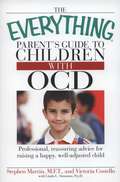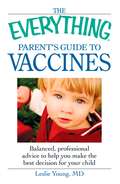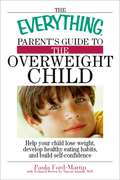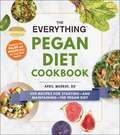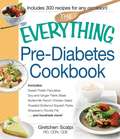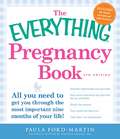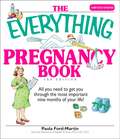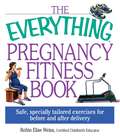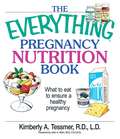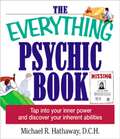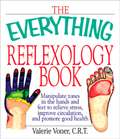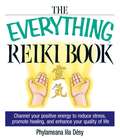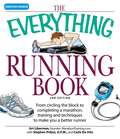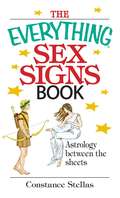- Table View
- List View
The Everything Parent's Guide to Children with OCD: Professional, Reassuring Advice for Raising a Happy, Well-adjusted Child
by Stephen Martin Victoria Costello Linda L. SimmonsIf you are the parent of one of the more than one million children with OCD, then you know what a confusing and disruptive disorder it can be. OCD can turn even simple tasks like homework and chores into almost impossible challenges. A child with OCD may feel stressed, worried, frustrated, frightened, and out of control.
The Everything Parent's Guide to Vaccines (The Everything®)
by Leslie YoungTo vaccinate or not? It’s a decision that all new parents must face within just a few days of their baby being born. Yet, with all the conflicting information on vaccines, it is difficult to sort through what is relevant and reliable. Concerned parents need a book that provides them with helpful information on:Types of vaccinesHow vaccines workVaccine safetyAdverse reactionsVaccination schedulesPossible links to autismThis guide presents easy-to-understand information along with the most up-to-date research. Unlike other books that try to pressure you with agendas and frightening data, this comprehensive guide allows you to come to your own conclusion—and make the right decision for your child.
The Everything Parent's Guide to the Overweight Child
by Paula Ford-MartinIf your child is overweight, he's not alone. According to the American Obesity Association, more than 30 percent of children ages 6 to 19 are now overweight. And half of those children are obese. You're worried about your child's health-and don't know what to do. Is your child's weight due to overeating? Lack of exercise? Genetics? The Everything Parent's Guide to the Overweight Child provides you with valuable insight on what causes children to become overweight and how to help them to change their eating habits and become more physically active. Most important, you'll learn what you can do to break the cycle of obesity that can lead to severe medical problems in the future. Author Paula Ford-Martin helps you: Prevent emotional overeating; Increase family awareness and sensitivity; Beat fat and calories when dining out; Incorporate physical activity into everyday routines; Track progress with journal entry pages. The Everything Parent's Guide to the Overweight Child provides the professional advice you need to deal with this sensitive issue, motivating your child to eat well, get active, and stay healthy.
The Everything Parent's Guide to the Overweight Child: Help Your Child Lose Weight, Develop Healthy Eating Habits, and Build Self-confidence
by Paula Ford-MartinA Simon & Schuster eBook. Simon & Schuster has a great book for every reader.
The Everything Pegan Diet Cookbook: 300 Recipes for Starting—and Maintaining—the Pegan Diet (Everything®)
by R.D. April MurrayA new spin on the paleo diet—300 recipes for healthy meals to live both your vegan and paleo lifestyles. The paleo and vegan diets have been combined to form the ultimate healthy lifestyle, reinventing the way people eat. This “pegan” cookbook is the perfect blend of both popular diets for those looking for whole, fresh and sustainable food that is high in healthy fats and vitamins. The Everything Pegan Diet Cookbook presents delicious meals that meet both of these dietary criteria. With this book you’ll learn everything you need to know about the pegan diet, including how to combine paleo and vegan recipes to ensure that you’re getting all of the nutrients you need. This book includes recipes for all meals and cravings throughout the day from a filling cherry vanilla breakfast smoothie to a satisfying Mediterranean salad or a savory vegetable roast to a sweet chocolate hazelnut spread. By focusing on fruits and vegetables and healthy fats (nuts, seeds, avocados, etc.), this plant-based, animal friendly diet will help you enjoy all your favorite dishes while staying healthy and living a sustainable lifestyle. Registered dietician April Murray ensures that all the recipes contain proper nutritional values, helping you stay on track with your goals to enjoy a healthier life overall.
The Everything Pre-Diabetes Cookbook: Includes Sweet Potato Pancakes, Soy and Ginger Flank Steak, Buttermilk Ranch Chicken Salad, Roasted Butternut Squash Pasta, Strawberry Ricotta Pie ...and hundreds more! (The Everything Books)
by Gretchen ScalpiThe delicious way to reverse your diabetes risk!A diagnosis of pre-diabetes doesn't mean that diabetes is inevitable. Changing your diet and activity level can help you avoid type 2 diabetes altogether. In The Everything Pre-Diabetes Cookbook, you'll find more than 300 recipes for delicious, healthy meals the whole family will love. Also included is a 10-week diet and exercise plan that will help you lower your diabetes risk.Registered dietitian Gretchen Scalpi has compiled 300 meals that are as tasty as they are healthy, including:Berry puff pancakesFresh baja guacamoleChipotle chicken wrapStir-fried ginger scallops with vegetablesHomemade macaroni and cheeseRich and creamy sausage-potato soupChocolate cheesecake mousseCranberry pecan biscottiArmed with this expert guide, you can recognize your unhealthy eating habits, find new healthier ways to prepare your favorite dishes, and stop diabetes in its tracks!
The Everything Pregnancy Book
by Paula Ford-MartinYou just got that positive pregnancy test and suddenly you feel lost in a sea of questions, concerns, what-ifs, and what-nows? To navigate this new world of body changes, blood tests, mood swings, and baby gear, you need a helpful guide that's with you from the first positive test to the last push. Luckily, this is the ideal guide for soon-to-be moms who are unsure of what to do after they get the big news. Completely revised and packed with even more information, this month-by-month resource walks you through the different phases of pregnancy and offers practical advice on: Understanding physical and emotional changes Selecting the right diet for you and baby Understanding prenatal tests and screenings Choosing the best labor and delivery options Budgeting for the new addition to the family This new edition also includes the latest information on nutrition, finding alternative care and treatments (yoga, anyone?), and checklists and worksheets to help parents-to-be plan for any occasion. This indispensable guide gives you the inspiration, support, and advice you need to get through your pregnancy--and beyond!
The Everything Pregnancy Book
by Vincent Iannelli Paula Ford-MartinYou just got that positive pregnancy test and suddenly you feel lost in a sea of questions, concerns, what-ifs, and what-nows? To navigate this new world of body changes, blood tests, mood swings, and baby gear, you need a helpful guide that's with you from the first positive test to the last push. Luckily, this is the ideal guide for soon-to-be moms who are unsure of what to do after they get the big news.Completely revised and packed with even more information, this month-by-month resource walks you through the different phases of pregnancy and offers practical advice on:Understanding physical and emotional changesSelecting the right diet for you and babyUnderstanding prenatal tests and screeningsChoosing the best labor and delivery optionsBudgeting for the new addition to the familyThis new edition also includes the latest information on nutrition, finding alternative care and treatments (yoga, anyone?), and checklists and worksheets to help parents-to-be plan for any occasion. This indispensable guide gives you the inspiration, support, and advice you need to get through your pregnancy--and beyond!
The Everything Pregnancy Book
by Paula Ford-MartinRecognized for its reassuring advice, authoritative information, and easy-to-understand style, The Everything Pregnancy Book, 3rd Edition is the must-have reference guide for a happy, healthy, and well-informed pregnancy. Updated, redesigned, and packed with even more information, this month-by-month resource walks moms (and dads!) to-be through the different phases of pregnancy and offers trusted information on how to:Understand and manage your physical and emotional changesMake the most of your monthly medical visitsStay active and select the right diet for you and babyReduce the risk of complicationsUnderstand prenatal tests and diagnostic screeningChoose the best labor and delivery options for youCovering every important topic from conception to delivery and beyond, The Everything Pregnancy Book, 3rd Edition promises to answer all of your questions, and more!
The Everything Pregnancy Book: All You Need to Get You Through the Most Important Nine Months of Your Life
by Paula Ford-MartinRecognized for its reassuring advice, authoritative information, and easy-to-understand style, The Everything Pregnancy Book, 3rd Edition is the must-have reference guide for a happy, healthy, and well-informed pregnancy. Updated, redesigned, and packed with even more information, this month-by-month resource walks moms (and dads!) to-be through the different phases of pregnancy and offers trusted information on how to:Understand and manage your physical and emotional changesMake the most of your monthly medical visitsStay active and select the right diet for you and babyReduce the risk of complicationsUnderstand prenatal tests and diagnostic screeningChoose the best labor and delivery options for youCovering every important topic from conception to delivery and beyond, The Everything Pregnancy Book, 3rd Edition promises to answer all of your questions, and more!
The Everything Pregnancy Book: All you need to get you through the most important nine months of your life!
by Paula Ford-MartinYou just got that positive pregnancy test and suddenly you feel lost in a sea of questions, concerns, what-ifs, and what-nows? To navigate this new world of body changes, blood tests, mood swings, and baby gear, you need a helpful guide that’s with you from the first positive test to the last push. Luckily, this is the ideal guide for soon-to-be moms who are unsure of what to do after they get the big news.Completely revised and packed with even more information, this month-by-month resource walks you through the different phases of pregnancy and offers practical advice on:Understanding physical and emotional changesSelecting the right diet for you and babyUnderstanding prenatal tests and screeningsChoosing the best labor and delivery optionsBudgeting for the new addition to the familyThis new edition also includes the latest information on nutrition, finding alternative care and treatments (yoga, anyone?), and checklists and worksheets to help parents-to-be plan for any occasion. This indispensable guide gives you the inspiration, support, and advice you need to get through your pregnancy--and beyond!
The Everything Pregnancy Fitness
by Robin Elise WeissNow you can regain control of your body and prepare for the rigors of childbirth with The Everything Pregnancy Fitness Book. Recent studies indicate that exercise during pregnancy can alleviate discomfort, increase energy levels, speed labor, and reduce the risk of complications. The Everything Pregnancy Fitness Book walks you through specially tailored exercises for toning and strengthening legs, arms, abdominal muscles, and the lower back-the parts of the body most affected by pregnancy and childbirth. Also included are tips and expert advice for creating a safe fitness plan for each trimester, dealing with the strains of pregnancy, and relieving stress.The Everything Pregnancy Fitness Book shows you how to:Assess your exercise needs and abilitiesExercise safely and avoid injuryEstablish a routine for walking, swimming, yoga, and aerobic activityCreate a program that enables you to lose weight quickly after your baby is bornThe Everything Pregnancy Fitness Book provides risk-free workouts to promote good health and well-being before, during, and after delivery.
The Everything Pregnancy Fitness
by Robin Elise WeissNow you can regain control of your body and prepare for the rigors of childbirth with The Everything Pregnancy Fitness Book. Recent studies indicate that exercise during pregnancy can alleviate discomfort, increase energy levels, speed labor, and reduce the risk of complications. The Everything Pregnancy Fitness Book walks you through specially tailored exercises for toning and strengthening legs, arms, abdominal muscles, and the lower back-the parts of the body most affected by pregnancy and childbirth. Also included are tips and expert advice for creating a safe fitness plan for each trimester, dealing with the strains of pregnancy, and relieving stress.The Everything Pregnancy Fitness Book shows you how to:Assess your exercise needs and abilitiesExercise safely and avoid injuryEstablish a routine for walking, swimming, yoga, and aerobic activityCreate a program that enables you to lose weight quickly after your baby is bornThe Everything Pregnancy Fitness Book provides risk-free workouts to promote good health and well-being before, during, and after delivery.
The Everything Pregnancy Nutrition Book
by Kimberly A. TessmerThe Everything Pregnancy Nutrition Book gives mothers expert advice on how to: - Know which vitamins, supplements, and herbs are safe to take- Manage pregnancy weight gain- Measure carbs, protein, fat, and sugar intake- Start baby on a healthy diet
The Everything Pregnancy Nutrition Book
by Kimberly A. TessmerThe Everything Pregnancy Nutrition Book helps you break down all that confusing information about prenatal vitamins, calorie counting, and smart food shopping. From getting healthy before conceiving to staying fit through each stage of pregnancy, you can shape your eating and exercise habits to contribute positively to your well-being-and ultimately, your baby's. The Everything Pregnancy Nutrition Book helps you design a well-balanced diet that's right for you and your baby, whether you're a teenage mother-to-be, an older expecting mom, or somewhere in between.With this engaging and enlightening book at your side, you can:Get the real deal on controversial foods such as fish, tea, wine, and cheeseAvoid harmful food additives and over-the-counter medicationsMake informed decisions in the supermarket and kitchenIndulge some cravings - and beat othersLearn the best ways to cope with the discomforts of pregnancyAssess which vitamins and minerals are most important during each trimesterand moreComplete with tips on prenatal care for your baby and methods for regaining your pre-baby figure, The Everything Pregnancy Nutrition Book is your complete resource for planning a healthy pregnancy from beginning to end!
The Everything Pregnancy Nutrition Book: What To Eat To Ensure A Healthy Pregnancy
by Kimberly A TessmerThe Everything Pregnancy Nutrition Book helps you break down all that confusing information about prenatal vitamins, calorie counting, and smart food shopping. From getting healthy before conceiving to staying fit through each stage of pregnancy, you can shape your eating and exercise habits to contribute positively to your well-being-and ultimately, your baby's. The Everything Pregnancy Nutrition Book helps you design a well-balanced diet that's right for you and your baby, whether you're a teenage mother-to-be, an older expecting mom, or somewhere in between.With this engaging and enlightening book at your side, you can:Get the real deal on controversial foods such as fish, tea, wine, and cheeseAvoid harmful food additives and over-the-counter medicationsMake informed decisions in the supermarket and kitchenIndulge some cravings - and beat othersLearn the best ways to cope with the discomforts of pregnancyAssess which vitamins and minerals are most important during each trimesterand moreComplete with tips on prenatal care for your baby and methods for regaining your pre-baby figure, The Everything Pregnancy Nutrition Book is your complete resource for planning a healthy pregnancy from beginning to end!
The Everything Psychic Book
by Michael R. HathawayHave you ever experienced an unexplained moment of clarity? The phone rings and you knew who was calling - even before answering . . . or you had a dream foreshadowing a job promotion the next day. How do these psychic phenomena happen? Can anyone learn to predict the future, read minds, and talk to people on the other side? The Everything Psychic Book introduces you to the mysterious world of psychic phenomena, explaining in simple terms how you can get in touch with your inner psychic.
The Everything Psychic Book: Tap into Your Inner Power and Discover Your Inherent Abilities
by Michael R HathawayA Simon & Schuster eBook. Simon & Schuster has a great book for every reader.
The Everything Reflexology Books
by Valerie VonerNow you can bring relief and comfort to yourself and others with easy-to-follow reflexology techniques. The Everything Reflexology Book walks you through the basic principles of this ancient practice and teaches you how to use the healing power of touch right in your own home.Provides professional instruction on how to:Utilize thumb-walking, knuckle presses, clapping, and other touch techniquesIdentify the zones and meridians that correspond to specific body partsAlleviate ailments through foot reflexesBalance energy flow throughout the body
The Everything Reflexology Books: Manipulate Zones in the Hands and Feet to Relieve Stress, Improve Circulation, and Promote Good Health
by Valerie VonerNow you can bring relief and comfort to yourself and others with easy-to-follow reflexology techniques. The Everything Reflexology Book walks you through the basic principles of this ancient practice and teaches you how to use the healing power of touch right in your own home.Provides professional instruction on how to:Utilize thumb-walking, knuckle presses, clapping, and other touch techniquesIdentify the zones and meridians that correspond to specific body partsAlleviate ailments through foot reflexesBalance energy flow throughout the body
The Everything Reiki Book: Channel Your Positive Energy to Reduce Stress, Promote Healing, and Enhance Your Quality of Life (Everything® Series)
by Phylameana Lila DesyFor centuries, Reiki has been valued by Eastern cultures as a means for relieving pain and balancing the body's natural energies. This hands-on healing method is now gaining subscribers in the Western world who seek a mind-body approach to overall wellness. The Everything Reiki Book introduces readers to basic Reiki techniques and teaches them how they can channel positive energy to reduce stress, enhance vitality, and strengthen the immune system. Packed with easy-to-follow instruction and helpful illustrations, The Everything Reiki Book is the perfect resource for readers interested in using this effective touch therapy in the comfort of their own homes.Reiki Master Phylameana lila Désy shows readers how to:Identify and tap into "life energy"Make use of Reiki principles for treating themselves and othersChannel positive energy through proper hand placementUse Reiki to alleviate specific ailments, such as indigestion and foot painIntegrate Reiki into all aspects of daily lifeWritten with the beginner in mind, The Everything Reiki Book is a practical approach to all-around wellness for the body, mind, and soul.
The Everything Running Book
by Art Liberman Dominique Carlo DevitoSure, running sounds easy enough. But a good running program involves more than just buying a pair of new sneakers and hitting the pavement. From gentle jogs to intense marathons, this guide will help you to choose the right equipment, train safely, and meet your running goals. Written by a veteran marathon runner and trainer, this book teaches you how to: Set immediate and long-term running goals; Prevent injuries; Avoid plateaus; Workout at any level; Regulate your water intake; Cross-train with weights and alternative methods (like yoga). You'll also find information on ensuring correct posture, tailoring running to your age, and training for and running a 5K, 10K, half-marathon, and marathon. The Everything Running Book, 2nd Edition has everything you need-from start to finish!
The Everything Running Book: From circling the block to completing a marathon, training and techniques to make you a better runner
by Art LibermanA Simon & Schuster eBook. Simon & Schuster has a great book for every reader.
The Everything Sex Signs Book
by Constance StellasLower your voice to seduce a Scorpio.Kiss the Bull's neck to make him see red.Start a fling with a Cancer at the new moon.Every sun sign has its match--in and out of bed. In this hot new edition of the classic bestseller, you'll learn the sensual secrets of the zodiac, including how to:Find their sexual soulmate using the author's sign compatibility quizAct and dress to attract any signRavish that special someone with sign-specific sexual techniques Determine the best (and worst) sun-sign matchesWith in-depth quizzes and descriptions of the sexual characteristics, favorite fantasies, and compatible matches of each sign, this entertaining guide is guaranteed to heat up any couple's sex life--one heavenly body at a time!
The Everything Sex Signs Book: Astrology Between the Sheets
by Constance StellasA Simon & Schuster eBook. Simon & Schuster has a great book for every reader.
